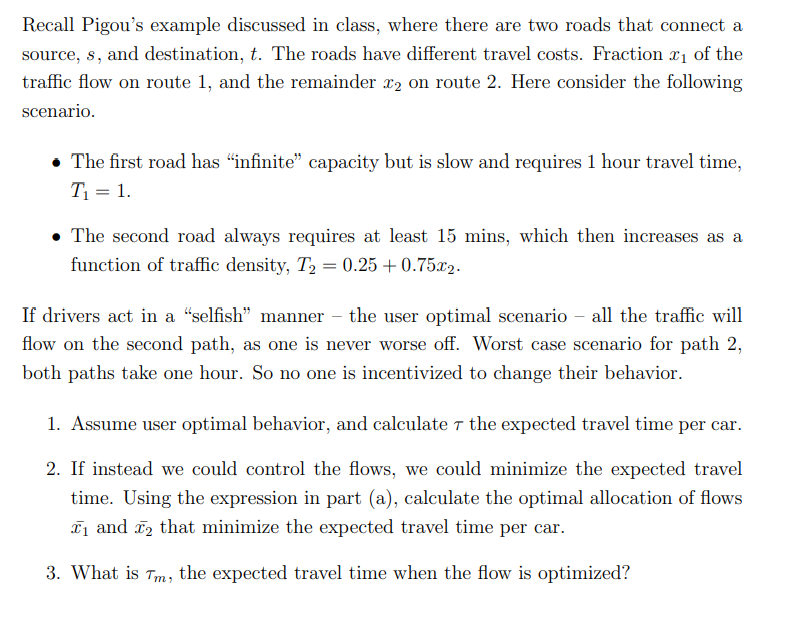Recall Pigou's example discussed in class, where there are two roads that connect a source, s, and destination, t. The roads have different travel costs. Fraction ₁ of the traffic flow on route 1, and the remainder x₂ on route 2. Here consider the following scenario. • The first road has "infinite" capacity but is slow and requires 1 hour travel time, T₁ = 1. • The second road always requires at least 15 mins, which then increases as a function of traffic density, T₂ = 0.25 +0.752. If drivers act in a "selfish" manner - the user optimal scenario - all the traffic will flow on the second path, as one is never worse off. Worst case scenario for path 2, both paths take one hour. So no one is incentivized to change their behavior. 1. Assume user optimal behavior, and calculate 7 the expected travel time per car. 2. If instead we could control the flows, we could minimize the expected travel time. Using the expression in part (a), calculate the optimal allocation of flows ₁ and ₂ that minimize the expected travel time per car. 3. What is Tm, the expected travel time when the flow is optimized?
Recall Pigou's example discussed in class, where there are two roads that connect a source, s, and destination, t. The roads have different travel costs. Fraction ₁ of the traffic flow on route 1, and the remainder x₂ on route 2. Here consider the following scenario. • The first road has "infinite" capacity but is slow and requires 1 hour travel time, T₁ = 1. • The second road always requires at least 15 mins, which then increases as a function of traffic density, T₂ = 0.25 +0.752. If drivers act in a "selfish" manner - the user optimal scenario - all the traffic will flow on the second path, as one is never worse off. Worst case scenario for path 2, both paths take one hour. So no one is incentivized to change their behavior. 1. Assume user optimal behavior, and calculate 7 the expected travel time per car. 2. If instead we could control the flows, we could minimize the expected travel time. Using the expression in part (a), calculate the optimal allocation of flows ₁ and ₂ that minimize the expected travel time per car. 3. What is Tm, the expected travel time when the flow is optimized?
Operations Research : Applications and Algorithms
4th Edition
ISBN:9780534380588
Author:Wayne L. Winston
Publisher:Wayne L. Winston
Chapter14: Game Theory
Section14.4: Two-person Nonconstant-sum Games
Problem 3P
Related questions
Question
Question in below picture

Transcribed Image Text:Recall Pigou's example discussed in class, where there are two roads that connect a
source, s, and destination, t. The roads have different travel costs. Fraction ₁ of the
traffic flow on route 1, and the remainder x2 on route 2. Here consider the following
scenario.
• The first road has “infinite” capacity but is slow and requires 1 hour travel time,
T₁ = 1.
. The second road always requires at least 15 mins, which then increases as a
function of traffic density, T₂ = 0.25 +0.75x₂.
If drivers act in a "selfish" manner - the user optimal scenario - all the traffic will
flow on the second path, as one is never worse off. Worst case scenario for path 2,
both paths take one hour. So no one is incentivized to change their behavior.
1. Assume user optimal behavior, and calculate the expected travel time per car.
2. If instead we could control the flows, we could minimize the expected travel
time. Using the expression in part (a), calculate the optimal allocation of flows
₁ and ₂ that minimize the expected travel time per car.
3. What is Tm, the expected travel time when the flow is optimized?
Expert Solution
This question has been solved!
Explore an expertly crafted, step-by-step solution for a thorough understanding of key concepts.
This is a popular solution!
Trending now
This is a popular solution!
Step by step
Solved in 3 steps

Knowledge Booster
Learn more about
Need a deep-dive on the concept behind this application? Look no further. Learn more about this topic, computer-science and related others by exploring similar questions and additional content below.Recommended textbooks for you

Operations Research : Applications and Algorithms
Computer Science
ISBN:
9780534380588
Author:
Wayne L. Winston
Publisher:
Brooks Cole

Operations Research : Applications and Algorithms
Computer Science
ISBN:
9780534380588
Author:
Wayne L. Winston
Publisher:
Brooks Cole